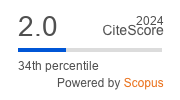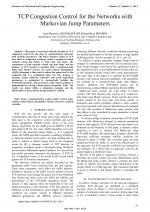| 2/2011 - 11 |
TCP Congestion Control for the Networks with Markovian Jump ParametersABOLMASOUMI, A. H. |
| Extra paper information in |
| Click to see author's profile in |
| Download PDF |
Author keywords
communication system traffic control, delay systems, linear matrix inequalities, Markov processes, random variables
References keywords
control(15), systems(14), markovian(9), delay(9), time(8), jump(6), design(6), robust(5), stability(4), parameters(4)
Blue keywords are present in both the references section and the paper title.
About this article
Date of Publication: 2011-05-30
Volume 11, Issue 2, Year 2011, On page(s): 67 - 72
ISSN: 1582-7445, e-ISSN: 1844-7600
Digital Object Identifier: 10.4316/AECE.2011.02011
Web of Science Accession Number: 000293840500011
SCOPUS ID: 79958802202
Abstract
This paper is concerned with the problem of TCP congestion control for the class of communication networks with random parameters. The linear dynamic model of TCP New Reno in congestion avoidance mode is considered which contains round trip delays in both state and input. The randomness of link capacity, round trip time delay and the number of TCP sessions is modeled with a continuous-time finite state Markov process. An Active Queue Management (AQM) technique is then used to adjust the queue level of the congested link to a predefined value. For this purpose, a dynamic output feedback controller with mode dependent parameters is synthesized to stochastically stabilize the TCP/AQM dynamics. The procedure of the control synthesis is implemented by solving a linear matrix inequality (LMI). The results are tested within a simulation example and the effectiveness of the proposed design method is verified. |
| References | | | Cited By |
Web of Science® Times Cited: 3 [View]
View record in Web of Science® [View]
View Related Records® [View]
Updated today
SCOPUS® Times Cited: 3
View record in SCOPUS® [Free preview]
View citations in SCOPUS® [Free preview]
[1] Stochastic hyperbolic random early detection controller based on probability density function estimator and particle swarm optimisation algorithm, Abharian, A.E., Khaloozadeh, H., Amjadifard, R., IET Communications, ISSN 1751-8628, Issue 6, Volume 6, 2012.
Digital Object Identifier: 10.1049/iet-com.2011.0120 [CrossRef]
[2] An LMI approach to design extended predictor feedback controllers for dynamical systems with input delay, Abolmasoumi, Amir Hossein, International Journal of Systems Science, ISSN 0020-7721, Issue 9, Volume 48, 2017.
Digital Object Identifier: 10.1080/00207721.2017.1295330 [CrossRef]
Disclaimer: All information displayed above was retrieved by using remote connections to respective databases. For the best user experience, we update all data by using background processes, and use caches in order to reduce the load on the servers we retrieve the information from. As we have no control on the availability of the database servers and sometimes the Internet connectivity may be affected, we do not guarantee the information is correct or complete. For the most accurate data, please always consult the database sites directly. Some external links require authentication or an institutional subscription.
Web of Science® is a registered trademark of Clarivate Analytics, Scopus® is a registered trademark of Elsevier B.V., other product names, company names, brand names, trademarks and logos are the property of their respective owners.
Faculty of Electrical Engineering and Computer Science
Stefan cel Mare University of Suceava, Romania
All rights reserved: Advances in Electrical and Computer Engineering is a registered trademark of the Stefan cel Mare University of Suceava. No part of this publication may be reproduced, stored in a retrieval system, photocopied, recorded or archived, without the written permission from the Editor. When authors submit their papers for publication, they agree that the copyright for their article be transferred to the Faculty of Electrical Engineering and Computer Science, Stefan cel Mare University of Suceava, Romania, if and only if the articles are accepted for publication. The copyright covers the exclusive rights to reproduce and distribute the article, including reprints and translations.
Permission for other use: The copyright owner's consent does not extend to copying for general distribution, for promotion, for creating new works, or for resale. Specific written permission must be obtained from the Editor for such copying. Direct linking to files hosted on this website is strictly prohibited.
Disclaimer: Whilst every effort is made by the publishers and editorial board to see that no inaccurate or misleading data, opinions or statements appear in this journal, they wish to make it clear that all information and opinions formulated in the articles, as well as linguistic accuracy, are the sole responsibility of the author.



